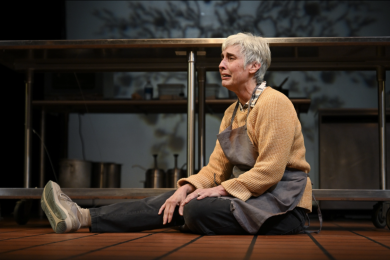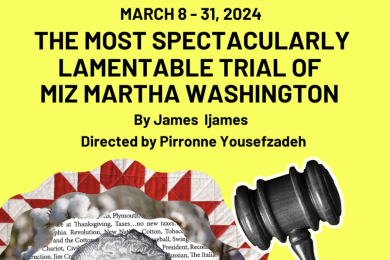Flower Girl Power
There is one indisputably subversive moment in Bartlett Sher’s revival of My Fair Lady, touring at the Orpheum this week. It comes in Act 2, when Alfred P. Doolittle (Adam Grupper) gets tight and throws bundles and bunches of cash in the air. Alfred is Eliza Doolittle’s low-born and once-impoverished father. He has been newly made rich after an American philanthropist, who had been devoted to advancing morality, dies and leaves him 4,000 pounds a year. This windfall occurred by way of daughter Eliza’s speech teacher, Professor Henry Higgins (Laird Mackintosh), who whimsically referred Mr. Doolittle to the said philanthropist as a “spokesman for British morality.” Mr. Doolittle now curses his inheritance, Higgens, and the whole “middle class morality” to which his new wealth binds and obligates him. Money has destroyed his happiness, he claims (though not enough to induce him to refuse the endowment). As an effect of mandatory bourgeois assimilation, Mr. Doolittle is finally getting married … in the morning. Before then, he gets all his friends together and they party all night -- perhaps the truer illustration of “British morality.”
Sher is the Tony Award winning Resident Director of Lincoln Center Theater, whose achievements include highly acclaimed re-imaginings of such Golden Age American musicals as The King and I and South Pacific. Making My Fair Lady woke, or at least palatable to 21st century audiences, is no easy feat. Jay Lerner had a serious misogyny problem (think Camelot and Gigi), and My Fair Lady could be said to normalize a facile view of class inequality while it celebrates patriarchy. What Sher has done in this revival is to try to insert the theme of liberation.
With revivals of this kind, the two questions are: (1) Is a play as dated and frequently offensive in its views about gender salvageable?; and (2) Is it worth saving? (I want to answer “yes” to the second question, if only because the musical score remains VERY beautiful.)
My Fair Lady is loosely based on George Bernard Shaw’s play, Pygmalion. The story centers on Eliza Doolittle (Shereen Ahmed), a poor “Flower Girl”, who sells small bouquets of posies on the streets where the upper crust gathers. She comes in contact with a Famous Phonetics Professor, Higgins, who is appalled by Miss Doolittle’s thick Cockney dialect; he suggests that it is their laziness in pronunciation that keeps the lower orders low. (“Why can’t the English teach their children how to speak?”) A fellow linguist, Colonel Pickering (Kevin Pariseau) thereupon makes a bet, daring Higgins to prove his theories of language and class by taking Miss Doolittle on as a student and teaching her to speak “like a lady.” If Higgins can pass her off as a Lady at the Imperial Ball some months ahead, he wins the wager. Higgins accepts the challenge.
Pygmalion was Shaw’s most popular play. Shaw insisted that the relationship between Higgins and Doolittle was non-romantic. Lerner was more-or-less faithful to this, though the movie version betrays it. Part of what Sher has done in this revival is to go back not to Shaw’s play, but rather to Shaw’s advocacy for equal rights for women. Sher inserts hints of social change and progress throughout: for example, there is a line of picketing suffragists march through the dance chorus. Additionally, the script is tweaked throughout (though Sher is stuck with the original lyrics). He attempts to frame and reflect critically upon the disturbing features of the musical that remain. Given the challenges involved, I’d say Sher has done as good a job as anyone could. Sher’s best innovation is to alter the play in such a way as to portray a feminist awakening. He focuses the 2nd Act around the growth of Eliza’s consciousness and her movement toward liberation. Still, when the play intrudes and complicates that narrative, he relies too heavily on vagueness and ambiguity to get him through.
The first thing we learn about Eliza is that she is dead broke and desperate for a break (or even a half-crown). Her most extravagant ambition is to have a roof over her head with decent heating. “All I want is a room somewhere.” (Okay; she wants a little more than that: an enormous chair. Also, chocolates and someone to take care of her.)
Our impressions – first, middle, and last – of Higgins are less positive. He is a terrible snob, and he rants obsessively about how awful women are and how superior men are in every way. Misogyny is built into the lyrics of several of the songs -- in particular, “I’m an Ordinary Man” (“But let a woman in your life ….”) and “A Hymn to Him” (“Why can’t a woman be more like a man?”). At one point, Professor Henry, in a rage manhandles Eliza, and it’s not funny. Indeed, the more we see of Henry’s rage, the less funny Henry gets. After a while, he just seems abusive, possessed with male fury. He goes on mansplaining through the very end of the play. That he needs Eliza’s company more than she needs his is soon obvious. When she shows signs of independence, he is nearly apoplectic.
Sher does not skirt the insistent questions, such as why Eliza takes so much abuse from Henry for so long. He shows her to have been so beaten down by a deadbeat, exploitive father, and by her poverty and all that entails. Her ego has been crushed out of her. But eventually, in part because she has been empowered by the new status her improved language brings her, Eliza refuses to be pushed around anymore. And she makes choices for herself.
Audiences expecting a light-hearted, feel-good experience, one that affirms the old ways and complacencies and ignores even the most basic societal changes since 1956, may come away disappointed. Those whose love of the genre -- and of the Lerner's lyrics and the music of Loewe's beautiful score -- can coexist with Sher’s foregrounding and re-evaluation of the bad-old-days features, will enjoy this production. I enjoyed it a lot, and I recommend it for several reasons, most of all because the touring company is sensational.
There remains the debate about the wisdom of throwing resources and talent toward the end of salvaging the Golden Age musical dinosaurs, riddled as they are with the multiple oppressions and blind spots of the past. On one hand, many reasonably wonder why we should continue to throw theaters’ slim resources into reviving these problematic works, when we could be investing that money and talent in developing new and socially aware musicals to replace them.
On the other hand, one does not have to spend many nights in the theater to know that not every new play is a Hamilton or a Rent; These old musicals have stood the test of time. They are more than merely crowd-pleasers; they are classics. They are politically problematic, but one might say the same thing about Verdi’s operas. Like those operas, these musicals, flawed as they are, have some extraordinary features and , above all, exquisite scores. The beauty of the songs is the more overwhelming when they are performed by actors with sumptuous voices like that of Shereen Ahmad, who plays Eliza Doolittle.
The sheer loveliness of Ahmad’s singing, along with her sensitive, remarkably unaffected portrayal of Miss Doolittle, carries the show. But everyone else in the cast is wonderful, too. The vocal quartet that performs “Wouldn’t it be Loverly” (Mark Aldrich, Colin Anderson, Shavey Brown, and William Michals) is outstanding. As Freddy Eynsford-Hill, Eliza’s timid aristocratic suitor, Sam Simahk, is marvelously dorky, but when he opens his mouth to sings the classic, “On the Street Where You Live,” he’s spellbinding. (Such pipes!) And Adam Grupper is an outstanding Afred Doolittle; his great big Act Two number, “Get Me to the Church on Time,” is a total gas. Sher thrillingly combines music hall routines (including a soft-shoe dance) with a chorus of Can Can dancers and drag queens and an aesthetic that hings at once on Brecht and beer halls. It is grand and marvelously entertaining-- Grupper brings down the house before he takes it to church.
One recalls that Pygmalion is based on one of the most patriarchal of Ovid’s myths: Pygmalion is a sculptor so narcissistic that he cannot bear to be around living, breathing women. But then he sculpts an ideal woman and falls in love with it. In My Fair Lady, Higgins, too, would shape a woman with no voice of her own and would breathe life into it. Sher, like Shaw, reminds us again that only the best people are capable of transformation.
Editor's Note: An eariler version of this article misattributed the lyrics and score to Lerner.




